Europe wants you to travel by train. But why is it so complex and expensive?
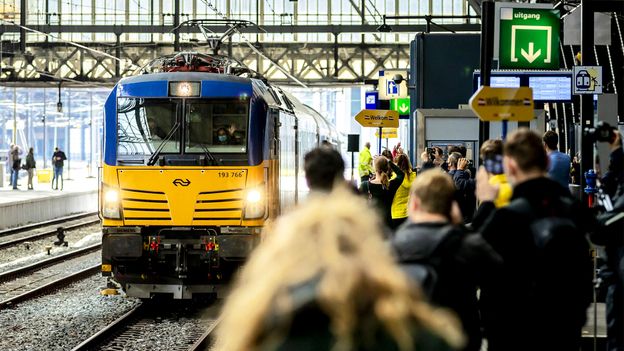
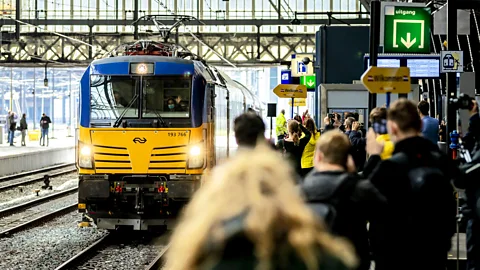 Getty Images
Getty ImagesAcross the continent, flights are priced at a fraction of the cost of train tickets, hampering the growing number of people who want to travel sustainably. The big question is: why?
When Tess Longfield booked her family holiday this year, sustainable travel was one of her major concerns.
“We wanted to go to Brittany,” she said, “and we wanted to travel by train because I felt it was more sustainable. I bought Eurostar tickets easily and was willing to pay extra in comparison to flying. I booked an Airbnb and planned to buy the Paris-to-Brittany train ticket closer to the time. I felt good about the trip.”
But it didn’t go according to plan. While Longfield bought the Eurostar tickets nine months ahead of the trip, the internal French rail tickets weren’t available – typically you can’t buy European train tickets more than six months in advance. They sold out immediately on the day they became available, leaving her with no option but to cancel the Eurostar tickets and book a flight instead.
“I’m trying to live a more sustainable life,” she said, “And I felt embarrassed. I felt ashamed that I ended up flying. I don’t mind spending more or it taking more time to arrange – I really wanted to do it by train.”
She’s not alone. Sustainability communications consultant Jo Geneen is based in Amsterdam and regularly travels across Europe by train to meetings in Hamburg, Paris and London. But she’s one of a growing number of consumers feeling frustrated about the difficulties of travelling by train compared to the far-less-sustainable option of flying.
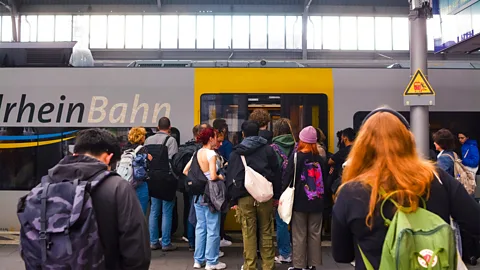 Getty Images
Getty Images“I recently booked a trip to Hamburg from Amsterdam,” Geneen said. “I was forced to cancel it at the last minute, and found the ticket was non-refundable. It’s so frustrating: it already cost more.” She was left with the choice of rebooking the trip, knowing it was non-refundable and more expensive, or booking a faster, flexible and refundable flight. Sadly, it was an easy choice to make.
“As a consumer, how can we make the right decisions? When you’re faced with routes that are four or five times cheaper to fly, it’s so hard to do the right thing.”
Thoughtful Travel
Want to travel better? Thoughtful Travel is a series on the ways people behave while away, from ethics to etiquette and more.
It’s a question seemingly at odds with what’s happening in Europe’s railways. Across the continent, rail travel is booming. Throughout 2024, night train routes across Europe have continued to expand and grow, led by Austria’s Nightjet network that now runs routes including Vienna-Venice and Paris-Berlin. Eurail, which runs Interrail, one of the continent’s best-known train travel brands, says it has seen the demand for European train travel and flight-free itineraries grow by 25% between 2022 and 2023.
There’s no question that people want to travel by train, despite the higher prices and occasional inconveniences. Some governments are also prioritising it. In France there is a ban on short-haul flights if there is a rail alternative that takes less than 2.5 hours; and in Spain, a similar ban is being considered as part of its 2050 climate action plan.
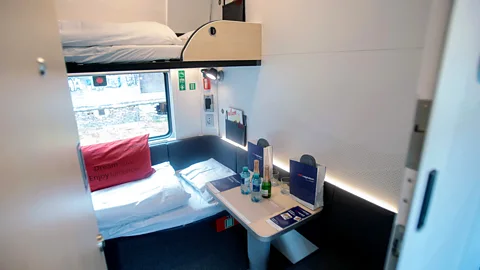 Getty Images
Getty ImagesYet, for all the rise in travel options and bookings, there continues to be a disconnect: people in Europe are finding that significantly higher prices and complicated booking situations thwart their desire to be sustainable.
Justin Francis, CEO of Responsible Travel, the world’s largest travel company dedicated to environmentally friendly travel, has been a long-term campaigner on the issue. He can see a few key reasons why train travel is struggling against Europe’s budget airline market.
“Why do we not tax aviation fuel, which is a fossil fuel, therefore artificially making aviation cheaper? We should have a fair taxation system,” he said. (Diesel fuel used for trains is currently taxed at differential rates across Europe, depending on the country.)
Another reason, he says, is that we need to join up train routes to make travelling by rail quicker and more efficient across Europe. And travellers should be able to book further ahead than 180 days – not being able to do so means that travel agents and tour operators can’t guarantee routes and plans far enough ahead of time, and can’t offer packages that would otherwise make sense, logistically and financially.
“The final reason is that under the EU package holiday regulations, if a tour operator books a customer on a holiday involving rail and the train is delayed or failed, the tour operator must refund them,” he says. “If they book with an airline and the airline is late or delayed or cancelled, the airline refunds them.”
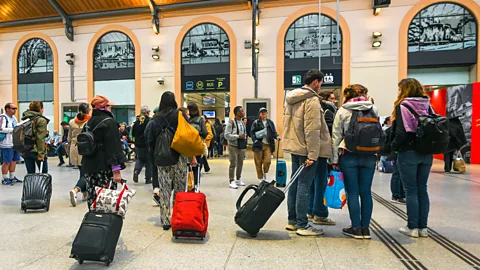 Getty Images
Getty ImagesWhat this all means for travellers is that buying a holiday where you travel by train is not likely to be a seamless one. You could be left sitting on a train platform waiting for a connection for longer than you’d like; it will probably be more expensive, and most likely you’ll have to book it yourself. In addition, as it’s harder for tour operators and travel agencies to book train travel for their customers, there’s less likelihood of getting a group rate and better prices, too.
These issues have not gone unnoticed at a government level. An EU Action Plan was launched earlier this year aiming to make rail travel more sustainable, efficient and well-connected across the continent. It’s a step forward to harmonising rail networks and working towards better solutions, but without addressing the taxation issue, and thereby levelling prices, it’s unclear if the EU’s commitment to making train travel the top choice will have the desired impact.
So, what can you do if you want to travel by train? Byway is a rare UK travel agent that arranges 100% flight-free travel across Europe. Using its custom JourneyAI programme, it plans and arranges trips, finding the best routes and bypassing the logistical issues of working across different currencies, languages and timetables for its customers in the process. Customers also have a WhatsApp number to call if they get rerouted or delayed during their trip.
“If you exclude time and money from the trip-planning process,” said James Hill, one of the company’s concierges, “Who wouldn’t want to travel by train in Europe?”
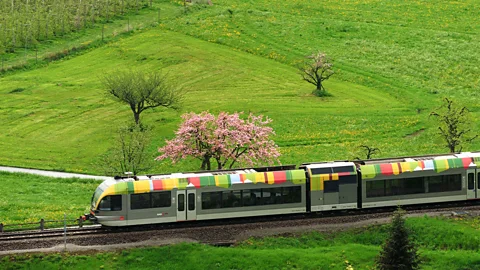 Getty Images
Getty ImagesByway says their customers enjoy the very things you can’t find when you’re travelling by plane: slow travel, a more old-fashioned slant on life, and the restaurant cars, where you can eat in comfort while watching the countryside pass by. “Italy is eternally popular as a destination for us,” says Hill. “It’s got tiny little regional trains that rattle through vineyards and super modern high-speed trains – some of the best in the world. It’s got sleeper trains that drive onto ferries in the middle of the night. It’s a perfect place to do rail travel.”
In the FAQs on their website, the company makes it clear that the price issue is one they would like to tackle too, also pointing out that airlines pay no fuel duty and plane tickets are zero-rated for VAT, meaning it’s much easier to offer cheap fares. Instead, they advocate for levies for frequent fliers, flight taxes and a ban on domestic short-haul flights.
Elswehere, Busbud is also seeking to make it easier to plan a flight-free trip by removing the logistical friction of booking via multiple operators. The firm, likened to an Expedia for ground transportation (bus, coach and train travel), offers a digital way to book point-to-point transport across the US, Canada and Europe without flying.
“Ground transportation is the last area of travel to be digitised and there’s so much to do and it is so, so complex,” explained Christine Pedersen, Busbud’s chief marketing officer. “As travellers, we’re looking for better solutions that aren’t flying. We talk about the pleasure in the journey and in the experience aspect that isn’t just about getting from A to B. You can look out the window, you can get up, you can walk about. You go into the cafe car and have a bite to eat. It’s a very different experience.”
While the journey might be slower, you don’t have to check in two hours before, you avoid long security screening queues, and you arrive in the heart of a city, not an hour away from it. All this means that, for many routes, you’re not losing a significant amount of time on the way.
However, from Francis’ perspective, significant changes need to take place before train travel comes anywhere near to taking over from air travel. “We need to compete on a level playing field,” he said. “I think we’ve been living on hope by encouraging people that rail travel is the answer. It’s time to get real. It isn’t the answer, unless we can address the fundamental issues.”
Related
Calls for over 60 free bus travel update from Department…
Calls for free bus travel for those over the age of 60 in England is gaining more attention after an increase of support. Unlike those in Wales, Scotland, and N
Major UK train station is one of the worst places…
Pickpockets are a problem across the UK, but one place is the worst for having your belongings stolen. According to the British Transport Police (BTP), just und
UK Snow Travel Chaos: Kent, East Sussex, West Sussex, Hampshire,…
UK Snow Travel Chaos: Kent, East Sussex, West Sussex, Hampshire, Wiltshire, Surrey, Berkshire, Greater London, Essex, Suffolk, Hertfordshire,
‘Only travel if necessary’ warning as UK’s busiest motorway shut…
NATIONAL Highways have issued an urgent warning to drivers as one the UK's biggest motorways shuts for the weekend. They has urged drivers to re-plan their rou












